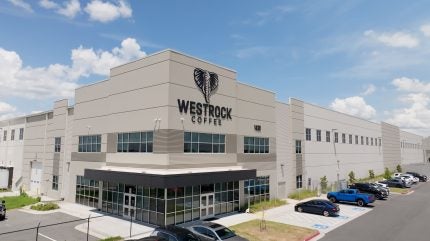
Private-label coffee and tea manufacturer Westrock Coffee has opened a new manufacturing facility in Arkansas, US, to meet the increasing demand for single-serve coffee.
The move is aimed at addressing the increasing demand from global customers, including various retail and coffee brands in North America.

Discover B2B Marketing That Performs
Combine business intelligence and editorial excellence to reach engaged professionals across 36 leading media platforms.
The new 525,000ft² ‘Clark’ facility, situated on William J. Clark Drive, will primarily manufacture single-serve coffee products, with the potential for future expansion into additional product formats.
It includes 130,000ft² dedicated to manufacturing, with the remaining space allocated for fulfilment and distribution.
The global demand for single-serve coffee is reportedly surging, with the coffee pods market expected to grow to $71.2bn by 2034 from $35.3bn in 2024. This growth is driven by consumers seeking quick, high-quality coffee options that offer convenience.
The Clark facility, equipped with advanced technology, is set to produce millions of single-serve cups daily, catering to this growing market and supporting new product innovations.

US Tariffs are shifting - will you react or anticipate?
Don’t let policy changes catch you off guard. Stay proactive with real-time data and expert analysis.
By GlobalDataWestrock Coffee chief operating officer Will Ford said: “The single-serve category is evolving rapidly, and we are scaling our operations to meet our customers’ needs.
“This expansive new facility significantly enhances our capabilities in the US market, and we are excited about the opportunities it will create for our existing and potential customers, employees, and the local community here in central Arkansas.”
The expansion is part of Westrock Coffee’s growth plan, which includes the opening of another large manufacturing facility in Conway last year, focused on ready-to-drink coffee products.
Westrock Coffee said its investment in central Arkansas is set to bolster the local economy with the creation of jobs in manufacturing, quality assurance, and logistics.
As production increases, the company plans to hire more employees, with an expectation to employ 900 people once both facilities operate at full capacity.





